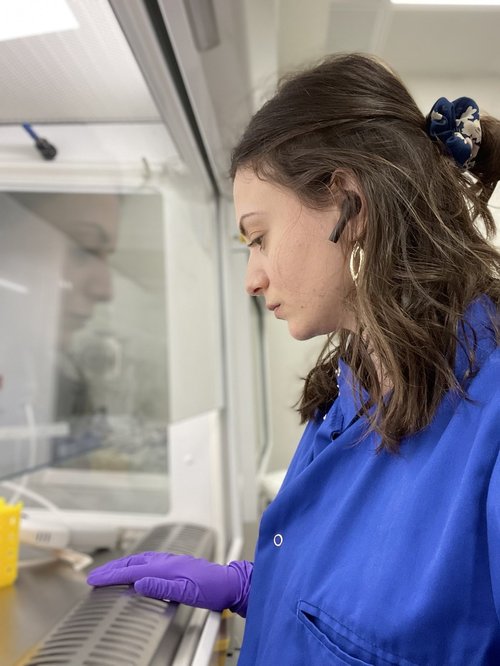Groundbreaking discovery could revolutionise treatment for deadly blood cancers
Press Release 13:44 - 28 April 2025

A new study at the Cambridge Stem Cell Institute published at Nature Biotechnology journal, has uncovered a groundbreaking finding that could transform treatment for Acute Myeloid Leukaemia (AML), a fast growing, aggressive, blood cancer that requires urgent treatment. This collaborative study was co-first authored by Dr Benson George, of the Flynn Lab and Dr Maria Eleftheriou of the Tzelepis lab.
AML is the second most common leukaemia type, with 3,100 people diagnosed in the UK every year. However, it has some of the worst survival rates of any cancer: nearly 80% of people diagnosed with AML today will not survive beyond five years.
This discovery shown that a protein called Nucleophosmin (NPM1) – which was thought to only be present inside most cells – is also present on the surface of leukaemia cells. This discovery challenges long-standing assumptions about cancer biology and opens up a whole new way to detect and target AML as well as other aggressive cancers with immunotherapy.
In immunotherapy, scientists look for proteins on the outside of cancer cells to help the immune system recognise and attack them, without harming healthy cells. While there are many immunotherapy treatments available, some subtypes of leukaemia do not respond to them. This research has identified a new protein target which could address this gap in treatment.
To test this idea Dr Tzelepis and Dr Maria Eleftheriou, with collaborators at the Boston Children's Hospital and Harvard Dept. of Stem Cell and Regenerative Biology (US), led by Dr Ryan Flynn and Dr Benson George, developed a new antibody that targets NPM1 on the cell surface. This antibody successfully killed AML cells, prolonged survival of experimental mice, and restored healthy blood production without any long-lasting effects.
More importantly, NPM1 is found to be present on the surface of leukaemia stem cells (LSCs)—the cells responsible for AML progression and relapse. Targeting these cells is currently difficult but could lead to treatments that not only get rid of leukaemia but also stop the relapse of the disease.
If further pre-clinical and clinical studies confirm these findings, NPM1-targeted therapies could represent a major breakthrough for AML and potentially some other cancers e.g. prostate and colorectal cancers.
Dr Konstantinos Tzelepis said: “The development of novel cancer therapies is strongly dependent on biomedical research and the discovery of new cancer biology. I am very pleased that our collaborative work has led to a promising biotechnology approach to targeting cancers of unmet medical need, like AML. Our aim is to derisk and expedite the translation of these discoveries into new effective treatments.”
Dr Ryan Flynn said: “Our work highlights how the combination of basic and translational science can be effectively combined to advance new ideas. In the past, targets like NPM1 were disregarded because there was no logic for it to be a marker, but combining our mutual interests in RNA biology pushed us to do the work to that resulted in this exciting discovery.”

Dr Maria Eleftheriou said: “Current treatments for AML often come with severe side effects and don’t always provide a lasting solution. This exciting discovery is at an early stage but has the potential to improve survival rates and quality of life for AML patients. As well as offering hope for developing similar targeted therapies for other cancers in the future.”
Fiona Hazell, CEO Leukaemia UK, said: “For the thousands of families in the UK devastated by AML each year, this is a vital breakthrough. Not only does it reshape our understanding of cancer biology, it opens the door to a new generation of immunotherapies that could deliver better outcomes for patients worldwide. We're proud to support bold, innovative research led by early career scientists—work like this is essential if we are to achieve our goal of doubling the five-year survival rate for AML within the next decade.”

